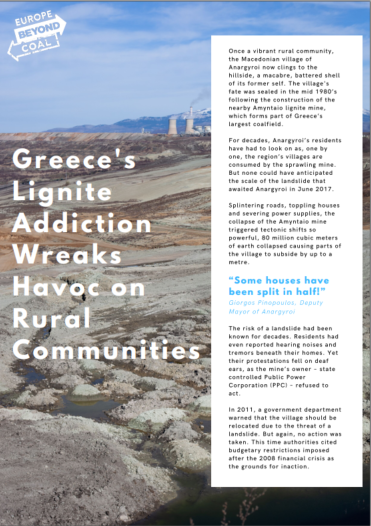25 September 2019
A European look at the UN Climate Action Summit Just Transition initiative: good idea, but key commitments missing.
By Katie Treadwell, Co-convenor of the Europe Beyond Coal just transition worksteam and Julia Sokolovicova, Europe Beyond Coal
_____________________________________________________________________________________
Following an explosion of interest in the concept of just transition over recent years, the topic was included as one of the 28 ‘initiatives’ to be signed up to at this year’s UN Climate Action Summit. Led by Peru and Spain, and backed by a working group including Poland, Greece, Nauru, the International Labour Organisation (ILO) and the World Health Organisation (WHO), the initiative has tried to tackle the important topic of just transition, but fell short in three critical areas:
1.Open and inclusive governance arrangements;
2.Plans to phase out fossil fuels;
3.Commitments to end fossil fuel subsidies.
1.No just transition without equal means of participation
The declaration recognises the need for a structured and inclusive dialogue at the heart of all just transition planning processes – and indeed has parallels with Europe Beyond Coal’s 7 golden rules for open and inclusive just transition planning. But it is still based on a top-down model of governance that has proven insufficient to address the transitional needs of coal communities in Europe. Local citizens have unrivalled insight into the situation and desires of their communities, and it is vital that their voices are heard. It is the role of experts to help translate these visions and needs into policy at a broader scale. But a leading role for communities in the just transition process, equal to that of national governments, must be secured.
2.No just transition without clear commitments to phase out fossil fuels
Setting clear fossil fuel phaseout dates provides a detailed framework around which long-term just transition strategies can be constructed. It also enables affected communities (not the fossil industry) to take the lead in tailoring solutions to their needs. These commitments have arguably been omitted from the initiative in favour of boosting the number of signatory countries. However, without such commitments, the rest of the positive commitments contained within the declaration are rendered toothless. Establishing a binding and accelerated phase out date for fossil fuels is crucial to achieving a just transition for fossil fuel dependant communities. After all, how can you plan a just transition away from fossil fuels without any details of how or when they will be phased out.
3.No just transition without a permanent commitment to end subsidies
Finally, the absence of any mention of ending financial support for the fossil fuel industry leaves the door wide open to companies seeking financial support to extend the lives of their old power plants and/or build new ones. Subsidising the fossil fuel industry is totally inconsistent with the Paris Agreement and frustrates attempts to establish clear phase out plans. With five EU member states indicating their intention to introduce new fossil fuel subsidies up until 2030 and significant amounts wasted in propping up fossil fuels in the Western Balkans and Turkey, this is undoubtedly still an ongoing issue. Making sure governments commit to ending subsidies is therefore a key ancillary component to just transition.
So what does this all mean for countries signing up to the initiative?
While this increased focus upon just transition at the UN Climate Action Summit is undoubtedly welcome, it is concerning that, on the issue of fossil fuel phase outs in particular, the initiative is so glaringly out of sync with global public support for urgent climate action. It is also clear that any country signing up to the initiative must go far beyond it if they want to take their just transition and climate responsibilities seriously. Unfortunately, until now, intergovernmental discourse on climate action and just transition has been weak, and this initiative is not ambitious enough to change that pattern. This is an important diplomatic effort, but it is a marker that we will quickly need to go beyond.

